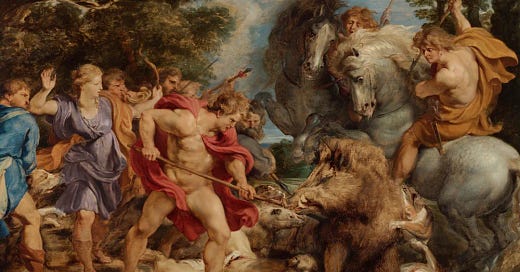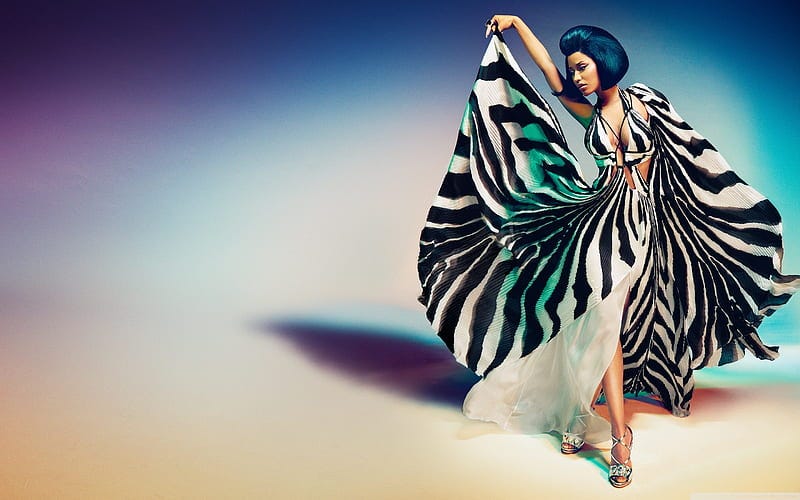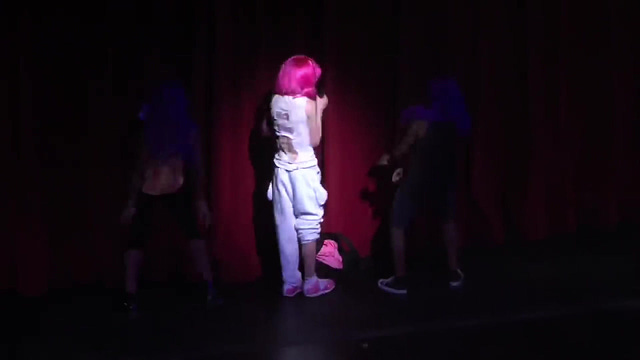The smear campaign on pigs has levels to it. With the exception of Babe, pigs are seen as grotesque. Riddled with muck and fatty disease, the pig represents a trio of deadly sins, sloth, greed and gluttony, and is taboo across the Abrahamic religions. Judaism, Christianity and Islam consider pigs to be unclean animals. The Book of Leviticus draws the distinction between the pig and other hoofed mammals: “the pig, because it has a divided hoof but does not chew the cud, is unclean for you.” Hoofed animals such as cows, sheep and goats all have four-chambered stomachs that regurgitate and digest food, filtering morsels into waste. Not porky. Everything the pig consumes plummets into its gut only to wither and rot. Lore of parasites, high sodium and fat cologne the consumption of pork. High cholesterol, heart disease and swine flu blot the pig’s reputation.
And yet, the consumption of the pig is endless. The New York Post estimates that over one million bacon, egg and cheese sandwiches are sold in New York City each day. The idyllic comfort of the BLT can be discovered on diner menus throughout North America. In Singapore, Din Tai Fung serves hot soup dumplings that envelope a mouth-watering medley of pork and truffle. Guanciale accents cacio e pepe and carbonara in the osterias of Italy. Pig feet, onions and parsley are boiled down to make pudding and souse on Sundays in Barbados.
The pig is also digested through pop culture, representing both virtue and vice. In mainstream media the pig is a shapeshifter, cute and docile as Piglet but sexy and charming as Miss Piggy. Stream Queen Peppa Pig is watched by over 700 million children in over 180 countries and translated into over 40 languages while the Orwellian pigs of Animal Farm act as stand-ins for the tyrants of the Soviet Union. Our decision to desire or distrust the pig lay on opposite sides of our brain like pigtails.
You see, within the pig lies the central tension of humanity. The quest for pleasure and enjoyment at the risk of pain and plague. The pig is supremely loved but also divinely hated, something that the precocious Onika Tanya Marag understood at the ripe age of fifteen when she wrote her breakout masterpiece “Itty Bitty Piggy.”
There is a subset of songs across cultures and demographics that are treated as sermons. That is, they aren’t meant to be solely listened to; they are meant to be soulfully observed. When heard, whether it be at a summer barbeque, your neighbour’s Bar Mitzvah, or your aunt’s second wedding, the world seems to stop as its participants’ eyes scan the room for mutual recognition. Whitney Houston’s “I Will Always Love You” comes to mind. The Killers’ “Mr. Brightside” is another. “Don’t Stop Believing”, “September” and “Back That Azz Up” all possess the same spellbinding psychosis.
Nicki Minaj delivers “Itty Bitty Piggy” with a braggadocios practice round. A gratuitous warm-up of forty seconds to allow the listener to complete their drink, collect their thoughts and round up their comrades prior to the song rewinding and starting over for real this time:
“You can't give it to 'em dry like that… / You gotta prep them for shit like that” she lectures, offering the listener both grace and a warning within the same breath.
In 2009, with only two mixtapes released prior to Beam Me Up, Scotty, Minaj was still an emerging force in the hip-hop scene. However, any self-awareness of her greenness cannot be located in “Itty Bitty Piggy.” In the cult-favourite, largely credited as the cornerstone of her “Barbz” fanbase (her “All to Well,” if you will), she establishes herself as a dominant player in rap within the first few bars:
Listen, I'm the baddest in the school, the baddest in the game
Excuse me, honey, but nobody's in my lane
Minaj’s rapid-fire delivery double-dutches between the masculine and feminine, embodying the machismo of her male-identifying rap counterparts without sacrificing her signature, doll-like girliness through feminal quips like “(Where the) fuck is my MAC concealer?” It is this subversion of gender politics that draws emphasis to her womanhood while simultaneously rejecting a need for a sisterhood. At this moment, she is here to reach up, not reach back.
Out of the twelve featured artists on Beam Me Up, Scotty, exactly zero are female. This dearth in representation is emblematic of the vacancy in hip-hop at the time without raptress-pioneers like Missy Elliott and Lil’ Kim to occupy the mic. It also is a deliberate choice from Minaj who is set on being seen as technically proficient and skilled as the men she aligns herself with. Repeatedly, Minaj draws distinction between her and other female rappers with vicious lines like:
These bitches so cranky, get 'em a hanky
M-mommy, I'm cold, gimme my blankie
It is clear that Minaj has never been a “girl’s girl.” But, to Minaj’s credit, her frustration with “female rap” is not anti-feminist. Hip-hop has always been about inspiring competition and provoking your opponents. Nas and Jay-Z’s 1996 feud over who was the best rapper in New York was a progenitor for Kanye West and 50 Cent’s feud over sales when they both chose to release their tertiary albums, Graduation and Curtis, on the same day in 2007. A couple of years later, with geography and genre already disputed over, Minaj tackled gender.
“Itty Bitty Piggy” is a three-act play, each act opening with Minaj progressively shifting into a more exaggerated version of herself, a technique she will later repeat in all-star verses on “Monster” and “Lookin’ Ass.”
Within the first act, Minaj doles out insult after insult to her ops, strategically positioning herself as superior. As a newcomer to the industry, this is a brilliant first-mover tactic as it allows her to set the confines of the rap game she is playing within. A game where her opponents are edible admirers of her rapidly growing oeuvre:
Pour some ranch, I'm gettin' the munchies
I think I'll have a rap bitch for my entree
'Cause they be thinkin' they can spit, spit-shine my shoes
You know I keep a bad bitch, let me sign your boobs
Minaj chews on the industry’s runts and heaves them out, unable to digest mediocrity in her four-chambered stomach. The idea of consuming competition harkens back to Foxy Brown's debut single, over a decade earlier, where she opens with “Rhyme or crime, let’s get it on. MCs want to eat me but it’s Ramadan.” Whether it's homage or coincidence is unknown. A flicker of familiarity to appetize before she transitions to the second act, the main course, where she addresses the titular character of the text: the “itty bitty piggy.”
Now if you see a itty bitty piggy in the market
Give that bitch a quarter and the car, tell her, "Park it"
I don't fuck wit pigs like As-salamu alaykum
I put 'em in a field, I let Oscar Myer bake 'em
Regard: a genius deployment of prose that foreshadows an upcoming aptitude for entendres. It is here that the rapper's focus migrates from annihilation to self-empowerment. When Minaj penned the track, in her bedroom as a teenager, she was bullied for her weight and insecure about her body. She has noted that the “itty bitty piggy” she takes aim at within the second act are the thinner critics responsible for her self-consciousness. Whether this perpetuates body-shaming or levels it is to be debated but I find it striking that nestled within a hard-core diss track is an attempt at female empowerment. This reflects the duality of the pig, tough or soft depending on if the world is set to broil. She repeats the hook a second time to ensure it sticks to the listeners' minds, her cadence a love child between a shamanic chant and nursery rhyme.
It is in the third and final act that Minaj is most caricatured. In a free flow of exhalations that feel less like rap and more like a Quaaluded-out prom queen acceptance speech, she dismounts her warhorse to observe the carnage. As if summarizing her thesis, she takes credit for her massacre:
Wow
It's like I just single-handedly annihilated
You know, every rap bitch in the building
And then, as if only now aware of her novelty, she re-introduces herself and her subsequent alter egos…
Like, like I'm Nicki Minaj, Nicki Lewinski, Nicki the Ninja
Nicki the Boss, Nicki The Harajuku Barbie
Like, I mean I don't even know why you girls bother at this point
Like give it up, it's me, I win, you lose
It’s childish but most wars are. If the DJ has made it to this part of the song, chances are it is this diatribe that most of her fans know word-for-word. Her performance - because that’s what it is, a performance - exposes her Laguardia roots, a New York performing arts high school known for nourishing stars (and Barbz) like Timothee Chamalet and Azealia Banks.
“Itty Bitty Piggy”’s success led Beam Me Up, Scotty to become the best-selling mixtape of all time. The song’s dynamism galvanized a community of fans and ignited a rap ingenue to global success. Later, Minaj went on become the first female rapper to have a diamond-certified single in the United States (with “Anaconda”) and the first female rapper to have six albums debut at number one on the Billboard 200 chart. Her legacy has proven that women in rap are in-demand, her success ushering in a swath of new rappers who all cite her as a central inspiration. However, her impact is beyond gender. Earlier this year, Nicki Minaj surpassed Drake as the rapper with the most digital number ones.
When you listen to Minaj’s contemporary work, the contempt she once held for her opponents in 2009 is still present. It's unclear if this unrelenting tenacity is driven by a genuine frustration with the quality of her competition or an anxious fixation on scarcity. Perhaps, the sexist structure of hip-hop have conditioned a psyche where both are true. Regardless, “Itty Bitty Piggy”’s impact and excellence warrant a moment of solitude for the rap pioneer. A reason for the Queen of Rap to stop looking over her shoulder. She’s more than brought home the bacon and has delivered an ever-relevant body of work that keeps her frenzied fans happy as pigs in mud. Bossed up with badassery left as detritus, Minaj is living out the vision her 15-year-old self manifested when first writing the song into existence.











This was such a great read. Loved it!